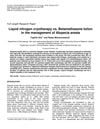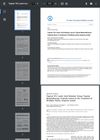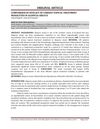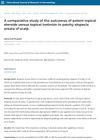 15 citations,
February 2013 in “Journal of Clinical Medicine and Research”
15 citations,
February 2013 in “Journal of Clinical Medicine and Research” Liquid nitrogen cryotherapy and betamethasone lotion are equally effective for treating alopecia areata.
 19 citations,
November 2016 in “Dermatology and therapy”
19 citations,
November 2016 in “Dermatology and therapy” Stopping the medication infliximab and starting new treatments helped a woman's hair grow back and improved her scalp condition.
 12 citations,
June 2020 in “Journal of The American Academy of Dermatology”
12 citations,
June 2020 in “Journal of The American Academy of Dermatology” Platelet-rich plasma is tolerable for lichen planopilaris and doesn't worsen the condition, but its effectiveness is unclear.
 2 citations,
March 2015 in “Expert opinion on orphan drugs”
2 citations,
March 2015 in “Expert opinion on orphan drugs” New treatments for hair loss show promise but need more research to confirm safety and effectiveness.
 1 citations,
January 2022 in “The Egyptian Journal of Hospital Medicine ”
1 citations,
January 2022 in “The Egyptian Journal of Hospital Medicine ” Cryotherapy and steroid injections are similarly effective and safe for treating alopecia areata.
 February 2024 in “PloS one”
February 2024 in “PloS one” Tofacitinib and adalimumab are promising treatments for cicatricial alopecia with few side effects.

Liquid nitrogen cryotherapy worked well for many patients with stubborn alopecia areata.

Liquid nitrogen cryotherapy is an effective treatment for alopecia areata.
 January 2016 in “Springer eBooks”
January 2016 in “Springer eBooks” Cryotherapy may be an effective and simple treatment for mild hair loss with few side effects.
7 citations,
January 2017 in “Dermatology Online Journal” TNF-inhibitor induced alopecia can be treated effectively with different therapies.
 October 2023 in “The Cochrane library”
October 2023 in “The Cochrane library” The medicine baricitinib was found to notably improve hair regrowth in alopecia areata, but more research is needed on its side effects and other treatments.
 1 citations,
July 2024 in “Skin Research and Technology”
1 citations,
July 2024 in “Skin Research and Technology” Patients with androgenetic alopecia have thinner subcutaneous fat layers in their frontal scalp compared to healthy individuals.
July 2021 in “MVP journal of medical science” Liquid Nitrogen Cryotherapy effectively treats unresponsive Alopecia Areata with minimal side effects.
 66 citations,
July 2003 in “International Journal of Dermatology”
66 citations,
July 2003 in “International Journal of Dermatology” Betamethasone valerate foam is more effective and safe for treating mild-to-moderate alopecia areata than betamethasone dipropionate lotion.
 January 2024 in “Al-Azhar International Medical Journal /Al-Azhar International Medical Journal”
January 2024 in “Al-Azhar International Medical Journal /Al-Azhar International Medical Journal” Betamethasone valerate lotion is more effective for treating multiple patchy alopecia areata.
January 2023 in “JOURNAL OF CLINICAL AND DIAGNOSTIC RESEARCH” Combining injections with lotion is more effective for hair regrowth in alopecia areata than using the lotion alone.
2 citations,
January 2021 in “Indian Journal of Dermatology, Venereology and Leprology” Betamethasone is more effective for hair regrowth than latanoprost but has more side effects.
A lotion with tretinoin, minoxidil, and betamethasone valerate helped treat a woman's skin infection.

Betamethasone dipropionate lotion is more effective than minoxidil solution for treating Alopecia Areata.
 15 citations,
May 2017 in “Journal of Dermatological Treatment”
15 citations,
May 2017 in “Journal of Dermatological Treatment” Latanoprost works better for hair growth, and combining it with betamethasone valerate is most effective.
 48 citations,
January 2011 in “International journal of trichology”
48 citations,
January 2011 in “International journal of trichology” Intralesional triamcinolone acetonide is the most effective treatment for localized alopecia areata.
 1 citations,
February 2015 in “Journal of evolution of medical and dental sciences”
1 citations,
February 2015 in “Journal of evolution of medical and dental sciences” 0.05% Betamethasone Dipropionate is the most effective topical treatment for alopecia areata.
 20 citations,
January 2000 in “Dermatologic Clinics”
20 citations,
January 2000 in “Dermatologic Clinics” New psoriasis treatments are effective but come with side effects and risks.
 December 2019 in “International Journal of Research in Dermatology”
December 2019 in “International Journal of Research in Dermatology” Strong steroid cream works better than tretinoin cream for patchy scalp hair loss.
 1 citations,
March 2023 in “Clinical, Cosmetic and Investigational Dermatology”
1 citations,
March 2023 in “Clinical, Cosmetic and Investigational Dermatology” Current treatments for Alopecia Areata have mixed success, and there's a need for better, more accessible options and support for affected individuals.
 19 citations,
January 2012 in “International Journal of Trichology”
19 citations,
January 2012 in “International Journal of Trichology” Propionibacterium acnes might be linked to hair casts and possibly alopecia.
 5 citations,
February 2017 in “Australasian Journal of Dermatology”
5 citations,
February 2017 in “Australasian Journal of Dermatology” Scarring hair loss found in female pattern; biopsy needed for diagnosis.
 April 2022 in “Research Square (Research Square)”
April 2022 in “Research Square (Research Square)” The combination of laser and topical steroids is more effective for treating alopecia areata than topical steroids alone.
 164 citations,
April 2008 in “Cochrane library”
164 citations,
April 2008 in “Cochrane library” Current treatments for alopecia show no significant long-term benefits.
 151 citations,
February 2007 in “International Journal of Dermatology”
151 citations,
February 2007 in “International Journal of Dermatology” Alopecia areata causes hair loss, has no cure, and various treatments exist.

























